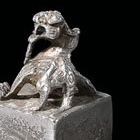J.J. Lally & Co., Oriental Art / New York City, New York
MenuPast Exhibition
Silver and Gold in Ancient China
March 16 – April 14, 2012
4.
AN ARCHAIC SILVER SEAL WITH BIXIE KNOP
Eastern Han Dynasty – Jin Dynasty, A.D. 2nd – 3rd Century
cast with a striding figure of a bixie on top of a solid square block, the mythical beast intricately modelled with the body of a tiger, the head with a pair of elongated horns, the shoulders with wings, tufts of fur at the cheeks and a long beard, shown with its body powerfully tensed, head pulled back and mouth open revealing rows of teeth, the surface unevenly oxidized to cloudy gray, the base with four seal characters cast in intaglio.
Height 3⁄4 inch (1.9 cm)
The seal may be read as ting □ yin xin (桯□印信), which may be translated as “Ting □, his seal,” indicating that this was a personal seal, not the seal of a magistrate or a general. The second character, indicating the given name, is indecipherable.
The bixie, an auspicious mythical beast in Chinese mythology said to have the power to ward off evil, was a popular subject in the Han dynasty and many Han seals with bixie knops are recorded, but cast silver seals surviving from the Han period are rare.
A similar gilt bronze seal cast with a bixie knop, in the National Palace Museum, Taipei, is illustrated on the cover of A Catalogue of the Special Exhibition of Bronze Seals Throughout the Dynasties in the National Palace Museum, Taipei, 1987, and also illustrated in several views inside the catalogue, pp. 241-242, no. 170, attributed to the Eastern Han dynasty.
東漢 – 晉 銀辟邪鈕桯__印信 高 1.9 厘米
